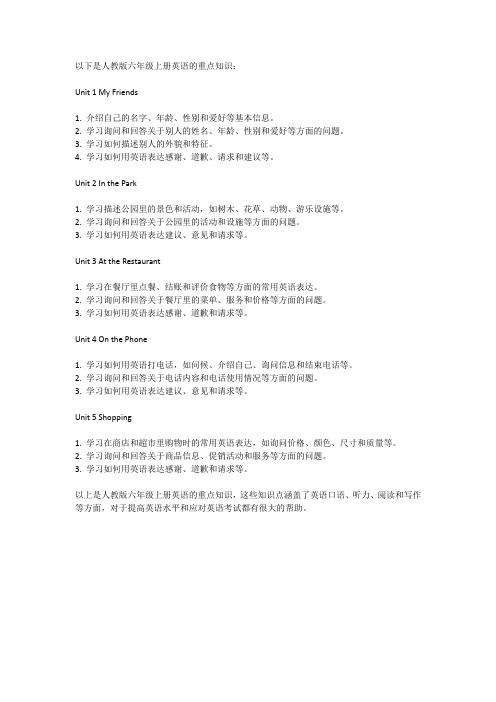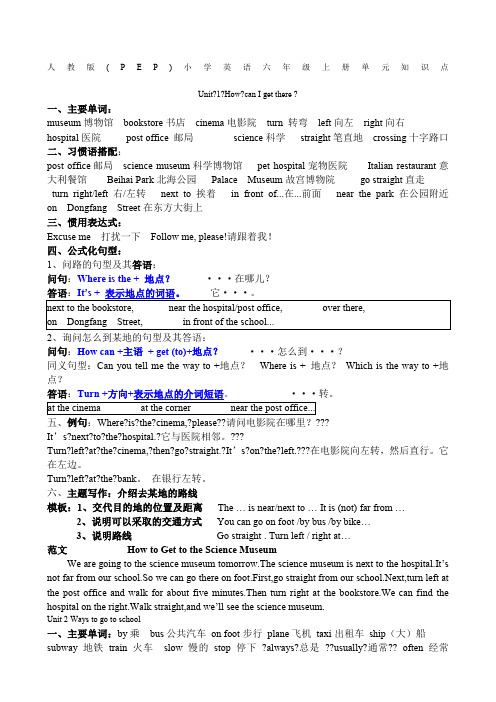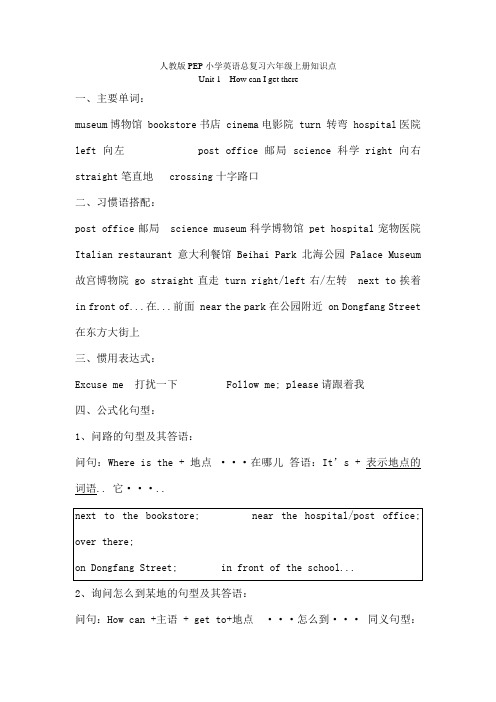人教版小学英语6年级上册知识点归纳
人教版(PEP)小学英语六年级上册知识点归纳

人教版(PEP)小学英语六年级上册知识点归纳Unit 1: How Can I Get There?In this unit。
we will learn some XXX.1.Key Words:Museum: a place where you can see art。
historical objects。
and other XXX.Bookstore: a shop where you can buy books.Cinema: a place where you can watch movies.XXX: to change n.Hospital: a place where people go to get medical treatment.Left: the opposite of right.Post office: a place where you can send letters and packages.Science: the study of the natural world.Right: the opposite of left.Straight: without XXX.Crossing: a place where two or XXX.eful Phrases:Post office: "Where is the post office?"Science museum: "Where is the science museum?"Pet hospital: "Where is the pet hospital?"XXX: "Where is XXX?"XXX: "Where is Beihai Park?"Palace Museum: "Where is the Palace Museum?"Go straight: "Go straight and you will see the bookstore on your left."Turn right/left: "Turn right at the crossing and you will see the hospital on your right."Next to: "The cinema is next to the bookstore."In front of: "The school is in front of the park."Near the park: "XXX is near the park."XXX: "XXX."mon ns:Excuse me: "Excuse me。
六年级上册英语人教版重点知识

以下是人教版六年级上册英语的重点知识:
Unit 1 My Friends
1. 介绍自己的名字、年龄、性别和爱好等基本信息。
2. 学习询问和回答关于别人的姓名、年龄、性别和爱好等方面的问题。
3. 学习如何描述别人的外貌和特征。
4. 学习如何用英语表达感谢、道歉、请求和建议等。
Unit 2 In the Park
1. 学习描述公园里的景色和活动,如树木、花草、动物、游乐设施等。
2. 学习询问和回答关于公园里的活动和设施等方面的问题。
3. 学习如何用英语表达建议、意见和请求等。
Unit 3 At the Restaurant
1. 学习在餐厅里点餐、结账和评价食物等方面的常用英语表达。
2. 学习询问和回答关于餐厅里的菜单、服务和价格等方面的问题。
3. 学习如何用英语表达感谢、道歉和请求等。
Unit 4 On the Phone
1. 学习如何用英语打电话,如问候、介绍自己、询问信息和结束电话等。
2. 学习询问和回答关于电话内容和电话使用情况等方面的问题。
3. 学习如何用英语表达建议、意见和请求等。
Unit 5 Shopping
1. 学习在商店和超市里购物时的常用英语表达,如询问价格、颜色、尺寸和质量等。
2. 学习询问和回答关于商品信息、促销活动和服务等方面的问题。
3. 学习如何用英语表达感谢、道歉和请求等。
以上是人教版六年级上册英语的重点知识,这些知识点涵盖了英语口语、听力、阅读和写作等方面,对于提高英语水平和应对英语考试都有很大的帮助。
人教版PEP三起小学英语六年级上册知识点总结

人教版PEP三起小学英语六年级上册知识点总结Unit1 How can I get there?一、重点单词和短语Science科学museum博物馆post office邮局bookstore书店cinema电影院hospital医院tasty美味的,可口的London Eye伦敦眼stomach胃crossing十字路口turn left/turn right向左/右转go straight=walk straight直走next to紧挨着/与……相邻far from(离……远)near在……附近behind(在……后面)in front of(在……前面)between…and…(在…和…之间)二、重点句子1.How do you go to school? 你是怎样去上学的?2.where is the restaurant? 餐馆在哪里?3. Usually I go to school on foot. 我通常走路去上学。
4. Sometimes I go by bike. 有时候我骑自行车去。
5.问路之前,出于礼貌,我们要说“Excuse me”与后面的句子要用标点符号隔开。
6.Look at the traffic lights, remember the traffic rules. 看着交通灯,记住交通规则。
7.Stop at a red light.Wait at a yellow light. Go at a green light.红灯停。
黄灯等一等。
绿灯行。
8.Red means stop, yellow means wait, green means go. 红色的意思是停止,黄色的意思是等待,绿色的意思是通行。
9.How can I get to the park? 我该怎样到达公园呢?10.You can go by the No.15 bus. 你可以坐15路公交车去。
人教版PEP小学英语六年级上册单元知识点总结

人教版(P E P)小学英语六年级上册单元知识点Unit?1?How?can I get there ?一、主要单词:museum博物馆bookstore书店cinema电影院turn 转弯left向左right向右hospital医院post office 邮局science科学straight笔直地crossing十字路口二、习惯语搭配:post office邮局science museum科学博物馆pet hospital宠物医院Italian restaurant意大利餐馆Beihai Park北海公园Palace Museum故宫博物院go straight直走turn right/left右/左转next to挨着in front of...在...前面near the park在公园附近on Dongfang Street在东方大街上三、惯用表达式:Excuse me 打扰一下Follow me, please!请跟着我!四、公式化句型:1、问路的句型及其答语:问句:Where is the + 地点?···在哪儿?答语:It’s + 表示地点的词语。
它···。
next to the bookstore, near the hospital/post office, over there,on Dongfang Street, in front of the school...2、询问怎么到某地的句型及其答语:问句:How can +主语+ get (to)+地点?···怎么到···?同义句型:Can you tell me the way to +地点?Where is + 地点?Which is the way to +地点?答语:Turn +方向+表示地点的介词短语。
人教版人教版小学英语六年级上册知识点归纳

人教版PEP小学英语总复习六年级上册知识点Unit 1 How can I get there一、主要单词:museum博物馆 bookstore书店 cinema电影院 turn 转弯 hospital医院left向左 post office 邮局 science科学right向右straight笔直地 crossing十字路口二、习惯语搭配:post office邮局 science museum科学博物馆 pet hospital宠物医院Italian restaurant意大利餐馆 Beihai Park北海公园 Palace Museum 故宫博物院 go straight直走 turn right/left右/左转 next to挨着in front of...在...前面 near the park在公园附近 on Dongfang Street 在东方大街上三、惯用表达式:Excuse me 打扰一下 Follow me; please请跟着我四、公式化句型:1、问路的句型及其答语:问句:Where is the + 地点···在哪儿答语:It’s + 表示地点的词语.. 它···..2、询问怎么到某地的句型及其答语:问句:How can +主语 + get to+地点···怎么到··· 同义句型:Can you tell me the way to +地点 Where is + 地点 Which is the way to +地点答语:Turn +方向+表示地点的介词短语.. ···转..五、例句:Where is the cinema; please 请问电影院在哪里It’s next to the hospital. 它与医院相邻..Turn left at the cinema; then go straight. It’s on the left. 在电影院向左转;然后直行..它在左边..Turn left at the bank.. 在银行左转..六、主题写作:范文How to Get to the Science MuseumWe are going to the science museum tomorrow.The science museum is next to the hospital.It’s not far from our school.So we can go there on foot.First;go straight from our school.Next;turn left at the post office and walk for about five minutes.Then turn right at the bookstore.We can find the hospital on the right.Walk straight;and we’ll see the scienc e museum.Unit 2 Ways to go to school一、主要单词:by乘 bus公共汽车 on foot步行 plane飞机taxi出租车 ship大船subway地铁train火车slow慢的stop停下always 总是;一直usually 通常often经常 sometimes 有时候 never 从来不二、习惯语搭配:by bike/bus/plane/subway/train/ship/taxi/ferry骑自行车/乘公共汽车/飞机/地铁/火车/船/出租汽车/渡轮 take the No.57 bus乘57路公共汽车 on foot步行 slow down慢下来 pay attention to注意 traffic lights 交通信号灯 look right向右看 cross the road横穿马get off下车 at home在家 traffic rules交通规则 get to到达 get on 上车be far from…表示离某地远三、惯用表达式:Wait等一等 Hooray太好了 I see. 我明白了..Go at a green light 绿灯行Stop at a red light 红灯停 Wait at a yellow light 黄灯等四、公式化句型:1、如何询问对方的出行方式:How do you cometo+地点你们怎么来···的2、如何用must表示必须做某事:某人+must+动词原形+其它···必须···..3、告诫别人不要做某事的句型:Don’t +动词原形+其它 .不要/别···..五、例句:How do you go to school 你怎么去上学 Usually I go to school on foot.Sometimes I go by bus. 通常我步行去上学..有时候骑自行车去.. How can I get to Zhongshan Park 我怎么到达中山公园 You can go by the No. 15 bus. 你可以坐15路公共汽车去.. I am far from school now. 我现在离学校很远.. My home is not far from our school. My home is near our school.我家离学校不远..六、主题写作:范文Don’t Be Against the Traffic RulesI go to school from Mondays to Fridays. I go to school by bike at 7:30 in the morning.I have to cross two busy roads.I know the traffic rules well.Slow down and stop at a yellow light.Stop and wait at a red light.Go at a green light.I always ride on the right side of the road.I am never against the traffic rules.Unit 3 My weekend plan一、主要单词:tomorrow明天film电影supermarket超市trip旅行tonight在今晚evening晚上/傍晚 next week下周comic连环画杂志 dictionary词典word单词 post card明信片 visit拜访二、习惯搭配:take a trip去旅行 go for a picnic去野餐go to the cinema去看电影 learn to swim学习游泳 visit my grandparents看望我外祖父母 get together 聚会go to the supermarket去超市 go ice-skating去滑冰 make a snowman 堆雪人 see a film看电影 make mooncakes做月饼 read a poem朗诵一首诗 this weekend这周末 Renmin Park人民公园 next week下周this morning/afternoon/evening今天上午/下午/晚上 next Wednesday 下星期三三、惯用表达式:What about you你呢 Here they are它们在这儿Can I help you我能帮助你吗 Sounds great听起来很棒Have a good time玩得开心 You too.你也是四、公式化句型:1、询问对方打算做什么的句型及其答语:问句:What are you going to do +其它你/你们···打算做什么答语:I’m/We’re going to +动词短语原形+其它. 我/我们打算···..2、询问对方打算去哪儿的句型及答语:问句:Where are you going+将来时间你/你们打算···去哪儿答语:I’m/We’re going to the+地点. 我/我们打算去···..3、询问对方打算何时去做某事的句型及答语:问句:When are you going to +动词短语原形你/你们打算什么时候···答语:I’m/We’re going to +动词短语原形+将来时间. 我/我们打算···..五、例句:What are you going to do on the weekend 你周末打算做什么I’m go ing to visit my grandparents this weekend 这个周末我打算去看望我的外祖父母..Where are you going this afternoon 你今天下午打算去哪里I’m going to the bookstore. 我打算去书店.. What are you going to buy 你打算去买什么I’m going to buy a comic book.. 我打算去买一本漫画书..六、主题写作:范文Let’s Have a Nice DayToday is Saturday.Tomorrow morning I’m going to the bookstore with my friends.We are going to look for some good books.We all like reading books.We are going to have lunch in a restaurant.I like chicken;beef and vegetables.After lunch;we are going to the Summer Palace by bus.We are going to play near the Kunming Lake.Maybe we are going to row a boat on the lake.That will be greatWe are coming back at 5 in the afternoon.Unit 4 I have a pen pal一、主要单词:studies学习第三人称单数形式puzzle谜hiking远足二、习惯搭配:read stories读故事 do kungfu练功夫 fly kites放风筝 play the pipa弹琵琶play sports进行体育活动 climb mountains爬山 listen to music听音乐sing English songs唱英文歌 on a farm在一个农场里 live in...住在···write an email to...给···写一封电子邮件 on the playground 在运动场上三、惯用表达式:Me too.我也是.. Really真的吗四、公式化句型:1、询问某人爱好的句型及其答语:问句:What are sb.’s hobbies ···有什么爱好答语:主语+like/likes+动词-ing形式+其它. ···喜欢···..2、由do/does引导的一般疑问句及其答语:问句:Do/Does+主语+动词原形+其它答语:Yes;主语+do/does. /No;主语+don’t/doesn’t.五、语法:1、动词变为动名词的规则:动词变为动名词;即是动词加ing..一般要遵循以下三条规则:1一般情况下;在动词的后面直接加ing..如:play—playing read—reading do—doing go—going2以不发音的字母e结尾的动词;要去掉不发音的字母e;再加ing..如:write—writing ride—riding make—making dance—dancing3以单元音加单辅音结尾的重读闭音节;要双写最后一个辅音字母;再加ing..如:run—running swim—swimming put—putting sit—sitting2、关于第三人称单数:动词变为第三人称单数形式的规则:1在一个句子中;如果主语人称既不是你;也不是我;而是另外的一个人;这时的人称叫做第三人称单数..2在第三人称单词的句子中;动词要使用第三人称单词形式..3动词变为第三人称单数形式;要遵循以下规则:①一般情况下;在动词的后面直接加s..如:read--reads make—makes write—writes②以字母s; x; o ; sh ; ch结尾的动词;在词尾加es..如:do—does wash—washes teach—teaches go—goes pass—passes③以y结尾的动词分为两个情况;以元音字母加y结尾的动词;在词尾直接加s..如:play—plays buy--buys以辅音字母加y结尾的动词;要把y变为i;再加es.如:study--studies④以f ; fe结尾的名词;先把f;fe变为v;再加-es.⑤特殊变化:have--has4在一个第三人称单数的句子中;只要句子中出现了does或者其否定形式doesn’t.该句子中的其他动词就要使用原形..5第三人称单数的肯定句在变为否定句时;在动词的前面加doesn’t. 动词恢复原形..如:he lives in Beijing.---he doesn’t live in Beijing.(6)第三人称单数的陈述句在变为一般疑问句时;用does开头;后面的动词也要变为原形..如:he lives in Beijing.---Does he live in Beijing 3、注意几个单词的变化: hobby复数形式—hobbies have to同义词—must六、反义词或对应词:get on上车---get off下车 near近的—far远的 fast快的—slow慢的 because因为—why为什么 same相同的—different不同的 here这里---there那里 east东---west西 north北---south南left左---right右 get on 上车---get off下车近义词: see you---goodbye sure---certainly---of course 七、主题写作:范文Li Ying’s HobbiesLi Ying likes English very much.She works hard at it.She reads English every morning.She likes speaking English .She likes listening to the radio;too.She watches TV only on Saturday evening.Does she like cooking Chinese foodNo; she doesn’t.She likes doing word puzzles.She doesn’t like playing basketball.Her parents love her.All the teachers love her;too.She says her hobbies make her happy.Unit 5 What does he do一、重点单词:factory工厂 postman邮递员police officer警察 fisherman渔民scientist科学家pilot飞行员 coach教练 businessman商人;企业家 worker工人二、习惯搭配:by car/bus/bike/plane/boat乘小汽车/公共汽车/自行车/飞机/船go to work去上班 study hard 努力学习 stay healthy保持健康 go home 回家 lots of 许多 go to the camp去度假营 be good at...擅长···三、惯用表达式:Cool酷What about you你呢That’s nice.那真好.. I see.我明白了..四、公式化句型:1、询问他人的职业的句型及其答语;问句:What does+主语第三人称单数+do ···是做什么的答语:He/She is a /an+职业名称. 他/她是一位···..2、询问他人的工作地点的句型及其答语:问句:Where does+主语第三人称单数+work ···在哪儿工作答语:He/She works+表示地点的介词短语. 他/她···工作..3、询问他人的上班方式的问句及其答语:问句:How does +主语第三人称单数+go to work ···怎么去上班答语:He/She goes to work+交通方式. 他/她···去上班..by bike/bus/subway/plane/train/ship/ferry/...on foot五、一些由动词变化而来的职业名词:teach—teacher clean—cleaner sing—singer dance—dancer drive—driver write—writer TV report—TV reporter act—actor act—actress art—artist engine—engineer六、主题写作:范文I Love My FamilyHere is a photo of my family.There are four people in my family.They are my father;my mother; my brother and me.My father is a doctor.He works in a hospital.He goes to workby subway.My mother is a teacher.She works in a school near my home.She goes to work by bike.Look; the tall boy is my brother.Heis older than me.He is a pilot.He’s in Beijing now.He goes thereby plane.I am a student now.I love my family.Unit 6 How do you feel一、主要单词:angry生气的 afraid害怕 worried担心的;发愁的 happy高兴的see adoctor看病 more更多的wear穿 deep深的breath呼吸名词count数数动词 sad难过的二、习惯搭配:feel angry/ill/happy/sad感觉生气/不舒服/高兴/难过 be afraidof...害怕··· be angry with...与···生气 take a deep breath深深吸一口气 count to ten 数到十 see a doctor看病 do moreexercise做更多的运动 wear warm clothes穿暖和的衣服chase the mice追赶老鼠drink some drinks喝一些饮料 have some popcorn吃一些爆米花三、惯用表达式:Here you are.给你.. Wait for me.等我一下.. Yum太美味了四、公式化句型:1、描述某人/某物害怕什么的句型:主语+be动词+afraid of +其他. ···害怕···..2、描述某人/某物与什么生气的句型:主语+be动词+angry with+其他. ···与···生气..3、询问某人怎么了的句型及其答语:问句:What’s wrong What’s the matterwith you 怎么了答语:某人+所处的状况..4、建议某人应该做某事的句型某人+should +动词短语原形+其他. ···应该···..五、做“对句子划线部分提问”试题时;一般应该遵循三个步骤:1. 确定与句子划线部分相应的特殊疑问词;并且特殊疑问词代替相应的划线部分..2. 把特殊疑问词代替划线部分后的句子变成一般疑问句..3. 最后再把特殊疑问词提到句首..以上三个基本步骤可以用三个字来概括;即:定;问;提..例如: This is a book①This is what. ②Is this what ③What is this 注意:句①②只是一种变化过程;不必写入试题中..句③才是试题所要求的形式和结果;必须写到试题上..以上三个步骤是对句子划线部分提问最基本的过程..六、主题写作:范文What Should You DoWhen you fell sad or worried;what should you do Let me tell you.First you should take a deep breath .Then you should listen toso me music.Next you will be relaxed.You won’t be so sad or worried.When you are afraid;what should you do It’s easy.You should ask your friends for help.If you have friends with you;you won’t feel afraid.Try to be happy every day.英语疑问词what;how;who;why;where;when的用法.一、what 什么用来问是什么;叫什么;做什么等1. What’s your name 你叫什么名字2.What is in your box 你的盒子里是什么3. What’s your father=What does your father do 你爸爸是干什么的一What time 什么时间用来问时间 What time is it 几点了二What colour 什么颜色用来问颜色 What colour is your bag 你的书包是什么颜色三What about 怎么样用来征求意见或询问感受等;大多用于承接上面的同样问题..1.What bout this pair of shoes 这双鞋子怎么样2.What about you 你呢3.What about your dad 你爸爸呢四What day 星期几用来问星期几 What day is it today/tomorrow 今天/明天星期几五What date 什么日期问具体的日期1.What’s the date today 今天是几号 2. What date is tomorrow 明天是几号六What …for 为何目的用来问目的;在一定情况下可以与why互换What did you buy that for=Why did you buy that 你为什么要买那个二、when 什么时候用来问时间 When do you get up你什么时候起床三、where 哪里用来问地点1. Where is my ruler 我的尺子在哪里2. Where are you going to 你打算去哪里3.Where are you from =Where do you come from 你是哪里人四、which 哪一个用来问具体的哪一个1. Which season do you like best 你最喜欢哪个季节2.Which classare you in 你在哪一个班 3.Which one is my pen 哪一支是我的钢笔五、Who 谁用来问人物是谁1.Who is that boy那个男孩是谁2. Who are you going to with你打算和谁一起去 3. Who is that pretty lady那个漂亮的女士是谁六、whose 谁的用来问东西是谁的1. Whose bag is this 这是谁的包2.Whose bike is yellow 谁的自行车是黄色的七、 why 为什么用来问原因1.Why do you like spring 你为什么喜欢春天2. Why did you go there 你为什么去那里八、 how 怎么样用来询问身体等状况1. How are you 你好吗2. How is your mother 你妈妈好吗一How old 几岁用来问年龄 How old are you 你几岁了二How long 多长用来问长度 How long are your legs 你的腿多长三How big 多大用来问物体的大小 How big is your bedroom 你的卧室多大四How tall 多高用来问高度 How tall is your brother 你弟弟有多高五How heavy 多重用来问重量 How heavy are you 你有多重六 How far 多远用来问路程 2 How far is it from here 从这儿去有多远七How many 多少用来问数量 How many apples do you have 你有多少苹果八How much 多少钱用来问价格 how much is this dress 这个连衣裙多少钱九How about 怎么样用来征求意见或询问感受等;大多用于承接上面的同样问题;用法与what about相同1. How about you 你呢2. How about that shirt 那件衬衣怎么样。
人教版小学英语六年级上册知识清单(全)

人教版小学英语六年级上册知识清单(全)小学英语六年级(上)单元必备知识清单Unit1 How Do You Go There?一、重点单词及短语:by经......,乘...... / foot脚(复数feet)/bike自行车/ bus公共汽车/train火车/plane飞机/ship轮船/subway地铁/how怎样,如何/go to school去上学/then然后/traffic交通/traffic light交通灯/traffic rule交通规则/stop停/wait等/get to到达/country国家(复:countries)drive驾驶/England英国/Australia澳大利亚/if如果/must必须/know知道※频度副词:always总是(100%)>usually通常(80%)>often通常(60%)>sometimes 有时候(40%)>hardly ever几乎不(20%)>never决不,从不(0%)※同音异义词:1.by经......,乘....../ buy购买/bye再见2.know知道/no不※反义词:different不同的—same相同的right右边的—left左边的二、重点句型:1、How do you go to school,Sarah?你怎么去上学,萨拉?2、Usually I go to school on foot.=I usually go to school on foot.我通常走路去上学。
3、Sometimes I go(to school) by bike.=I sometimes go (to school)by bike.有时候我骑自行车去。
4、Stop at a red light.红灯停。
Wait at a yellow light.黄灯等。
Go at a green light.绿灯行。
小学六年级英语上册各单元知识点汇总(人教版)
Whendoyougotoschool?你什么时候去上学?(4)whattime几点了。
用来问具体的时间,如:Whattimeisit?现在几点了?(5)Whatcolour什么颜色。
用来问物体的颜色。
如:Whatcolourisyourschoolbag?你的书包是什么颜色的?(6)Whatkindof什么种类。
用来问类别。
如Whatkindoffruitdoyoulike?你最喜欢哪一种水果?(7)who谁。
用来问人物是谁。
如:WhoisyourEnglishteacher?你的英语教师是谁?Who'sthatman?那个男人是谁?(8)whose谁的。
用来问物体的主人是谁?如:Whosepencilisthis?这是谁的铅笔?Whosebikeisblue?谁的自行车是蓝色的?(9)which哪一个。
用来问具体的哪一个。
如:Whichseasondoyoulikebest?你最喜欢哪个季节?Whichpencilisken's?thelongoneortheshortone?哪只铅笔是Ken的?长的那支还是短的那支?(10)how怎样?用来问身体状况,或者事情的状况,对事件的看法等。
如:Howareyou?你好吗?Howisyourmother?你妈妈好吗?(11)howmany多少个。
用来问有多少个,后面要跟名词的复数形式。
如:Howmanybooksdoyouhave?你有多少本书?Howmanykitescanyousee?你能看见多少只风筝?(12)howmuch多少钱。
用来问物体的价钱。
如:Howmucharethey?他们多少钱?Howmuchisyourschoolbag?你的书包多少钱?(13)howold几岁了。
用来问年龄。
如Howoldareyou?你几岁了?Howoldisyourfather?你爸爸多大了?(14)why为什么。
用来问原因,一般要用because来答复。
人教版小学英语六年级上册各单元知识点
人教版小学英语六年级上册各单元知识点Unit 11. 日常用语-问候和告别- How are you? I'm fine.- What's your name? My name is...2. 常用动词- like, love, hate, enjoy, have3. 数字和时间- 数字:one, two, three, four, five, six, seven, eight, nine, ten - 时间:What time is it? It's...4. 颜色- 红色:red- 黄色:yellow- 蓝色:blue- 绿色:green- 橙色:orange- 紫色:purpleUnit 21. 日常用语-购物- How much is it? It's...2. 动物- 狗:dog- 鸟:bird- 鱼:fish- 熊猫:panda- 大象:elephant3. 食物- 苹果:apple- 香蕉:banana- 面包:bread- 糖果:candy- 葡萄:grape- 冰淇淋:ice cream4. 数量- 单数:one, two, three, four, five - 复数:six, seven, eight, nine, tenUnit 31. 日常用语-介绍人- This is my friend. His name is...2. 学科- 数学:math- 英语:English- 音乐:music- 体育:PE3. 预备动词- can, can't, must4. 职业- 医生:doctor- 教师:teacher- 消防员:firefighter- 安保人员:security guard- 演员:actorUnit 41. 日常用语-问路和指路- Excuse me. Where is the...? It's over there.2. 季节和天气- 春天:spring- 夏天:summer- 秋天:fall- 冬天:winter3. 身体部位- 头:head- 手:hand- 脚:foot- 膝盖:knee- 肩膀:shoulder4. 方位词- 上方:above- 下方:below- 前方:in front of- 后方:behind- 旁边:next toUnit 51. 日常用语-约会和度假- Would you like to...? Yes, I'd love to.2. 运动和活动- 游泳:swim- 跑步:run- 跳绳:jump rope- 弹吉他:play the guitar- 看电影:watch movies3. 服装和颜色- 衬衫:shirt- 裤子:pants- 运动鞋:sneakers- 黑色:black- 白色:white4. 手表和日历- 时间:What time is it? It's...- 日期:What's the date today? It's...Unit 61. 日常用语-邀请和礼仪- Please come to my party. Thank you for inviting me.2. 家庭成员和描述- 爸爸:dad- 妈妈:mom- 姐姐:sister- 哥哥:brother- 孩子:child3. 饮料和食物- 牛奶:milk- 咖啡:coffee- 汉堡:hamburger- 面条:noodles- 披萨:pizza4. 介绍自己- My name is... I'm from... I like...Unit 1:在日常生活中,问候和告别是必不可少的。
人教版小学英语六年级英语上下册知识点复习考点
人教版小学英语六年级上下册知识点复习要点上册1、地点单词 hospital2、方位介词 between on in3、动作词组 go straight4、Where is the +地点?5、How can +主语+get to+地点6、交通方式词组7、有关交通信号用语8、How do you get to+地点?9、频度副词10、活动短语11、书籍类词语12、一般将来时两种表达方式13、主语+be going to14、询问去哪里 Where are you going?15、作文 My weekend plan16、动词三单形式17、常用短语归类18、询问某人的爱好19、like to +20、辅音字母y 结尾变y为i加es21、现在分词变化规则22、职业词汇23、询问职业24、询问工作地点25、询问去工作的方式26、表达感情的词语27、询问对方的感觉28、should情态动词的用法29、be afraid of用法下册1、比较级在一般现在时的运用2、询问年龄、身高、体重H ow old……How tall……3、询问物品的情况4、形容谁比谁更……5、过去时态动词词组6、动词过去时变化规则7、询问某人周末过得怎么样8、Did 引导的一般疑问句,就过去发生的某种行为动作进行问答9、What 引导的特殊疑问句,就过去已经发生的行为进行问答10、一般过去时的特殊疑问句11、询问对方的身体状况12、过去时间表达法13、一般现在时和一般过去时区分14、表示过去不能做或者不会做的句型I can’t do……15、表示不喜欢的句型I don’t like……16、表示以前没有某物的句型17、用Before和Now描述以前和现在不同的情形Before……Now……18、肯定句变否定句的用法19、组词成句的方法20、形容词比较级和最高级的变化规则big-bigger-biggest21、一般过去时的定义。
人教版人教版小学英语六年级上册知识点归纳图文稿
人教版人教版小学英语六年级上册知识点归纳集团文件发布号:(9816-UATWW-MWUB-WUNN-INNUL-DQQTY-人教版(PEP)小学英语总复习六年级上册知识点Unit1Howcan I get there一、主要单词:museum博物馆 bookstore书店 cinema电影院 turn 转弯 hospital医院 left向左 post office 邮局 science科学right向右straight笔直地 crossing十字路口二、习惯语搭配:post office邮局 science museum科学博物馆 pet hospital宠物医院Italian restaurant意大利餐馆 Beihai Park北海公园 Palace Museum 故宫博物院 go straight直走 turn right/left右/左转 next to挨着in front of...在...前面 near the park在公园附近 on Dongfang Street在东方大街上三、惯用表达式:Excuse me 打扰一下 Follow me, please!请跟着我!四、公式化句型:1、问路的句型及其答语:问句:Where is the + 地点?···在哪儿?答语:It’s + 表示地点的词语。
它···。
2、询问怎么到某地的句型及其答语:问句:How can +主语 + get (to)+地点···怎么到···同义句型:Can you tell me the way to +地点Where is + 地点Which isthe way to +地点答语:Turn +方向+表示地点的介词短语。
···转。
五、例句:Whereisthecinema,please请问电影院在哪里?It’snexttothehospital. 它与医院相邻。
- 1、下载文档前请自行甄别文档内容的完整性,平台不提供额外的编辑、内容补充、找答案等附加服务。
- 2、"仅部分预览"的文档,不可在线预览部分如存在完整性等问题,可反馈申请退款(可完整预览的文档不适用该条件!)。
- 3、如文档侵犯您的权益,请联系客服反馈,我们会尽快为您处理(人工客服工作时间:9:00-18:30)。
人教版小学英语6年级上册重难点
Unit 1 How do you go there?
主要单词:
by plane 坐飞机by ship 坐轮船on foot步行 by bike 骑自行车 by bus 坐公共汽车
by train 坐火车traffic lights交通灯 traffic rules交通规则Stop at a red light 红灯停 wait at a yellow light 黄灯等go at a green light 绿灯行
主要句子:
How do you go to school 你怎么去上学
Usually I go to school on foot. Sometimes I go by bike.通常我步行去上学,有时候骑自行车去。
How can I get to Zhongshan Park 我怎么到达中山公园
You can go by the No. 15 bus.你可以坐15路公共汽车去。
Unit 2 Where’s the science museum?
主要单词:
library 图书馆post office 邮局 hospital医院 cinema 电影
院 bookstore书店
science museum科学博物馆 turn left向左转 turn right 向右转 go straight 直行 north北 south南east东 west西
主要句子:
Where is the cinema, please 请问电影院在哪里
It’s next to the hospital. 它与医院相邻。
Turn left at the c inema, then go straight. It’s on the left.在电影院向左转,然后直行。
它在左边。
知识点:
1、in the front of…表示在…的前面,是指在该地方的范围内,in front of而则表示在该地方的范围外。
如:in front of our classroom是指在教室的外面而且在教室的前面。
而in the front of classroom则是指在教室里的前面。
2. Be far from…表示离某地远. be 可用am , is ,are。
如:I am far from school now.我现在离学校很远。
My home is not far from school.我的家离学校不远。
Unit 3 What are you going to do?
主要单词:
this morning /afternoon/ evening 今天上午/下午/晚上next week下周tonight 今晚
post card 明信片comic book漫画书newspaper报纸
主要句子:
What are you going to do on the weekend 你周末打算做什么
I’m going to visit my grandparents this weekend这个周末我打算去看望我的外祖父母。
Where are you going this afternoon 你今天下午打算去哪里
I’m going to the bookstore.我打算去书店。
What are you going to buy 你打算去买什么
I’m going to buy a comic book。
我打算去买一本漫画书。
知识点:
1、this evening 和 tonight的区别:this evening指的是今天晚上睡觉以前的时间,一般指晚上十二点以前。
而tonight指的是今晚,一般是指一整晚的时间,通宵。
2、What kind of 什么种类。
用来问类别。
如What kind of fruit do you like你最喜欢哪一种水果?
3、I want to be…我想成为… 表示理想。
Unit 4 I have pen pal
主要单词:
hobby 爱好 dive 跳水 ride a bike 骑自行车 make kites 制作风筝 collect stamps 集邮
live 居住;住 teach 教 go 去 watch 看 read 读;看 doesn’t =does not
主要句子:
What’s your hobby 你的爱好是什么
I like collecting stamps. 我喜欢集邮。
He likes collecting stamps, too. 他也喜欢集邮。
Does she teach English 她教英语吗
No, she doesn’t. 不,她不教。
动词变为动名词的规则:
动词变为动名词,即是动词加ing。
一般要遵循以下三条规则:
(1)一般情况下,在动词的后面直接加in g。
如:
play—playing read—reading do—doing go—going
(2)以不发音的字母e结尾的动词,要去掉不发音的字母e,再加I n g。
如:write—writing ride—riding make—making dance—dancing
(3)以单元音加单辅音结尾的重读闭音节,要双写最后一个辅音字母,再加I n g。
如:run—running swim—swimming put—putting sit—sitting
Unit 5 What does she do
主要单词:
singer 歌唱家;歌手writer 作家 actor 男演员 actress 女演员 artist 画家 TV reporter 电视台记者 accountant 会计 policeman (男)警察 salesperson 销售员cleaner 清洁工
主要句子:
What does your mother do 你妈妈是干什么的
She is a TV reporter. 她是电视台记者。
Where does she work 她在哪工作的
How does she go to work 她怎么去工作的
一些由动词变化而来的职业名词:
teach—teacher clean—cleaner sing—singer dance—dancer drive—driver write—writer TV report—TV reporter
act—actor act—actress art—artist engine—engineer
Unit 6 The story of rain
主要单词:
vapour 蒸汽;水汽 sun 太阳 stream 河;溪 again 再一次;又;再 seed 种子 soil 土壤 sprout 苗;芽;嫩芽 plant 植物;种植 should 应该 then 然后
主要句子:
Where does rain come from 雨是从哪来的
It comes from the clouds. 它来自云。
How do you do that 你是怎么做的
What should you do then 你接着要做什么。
